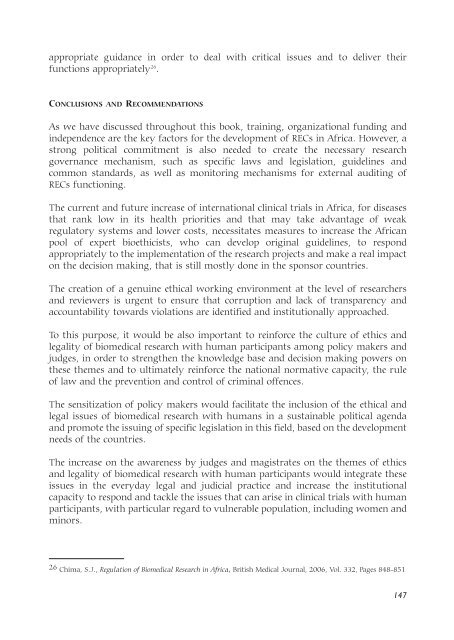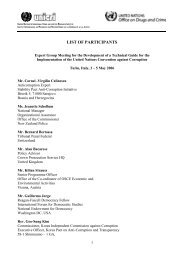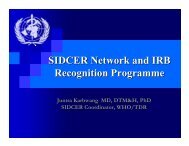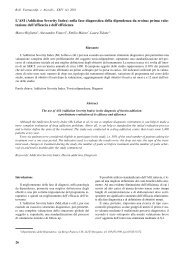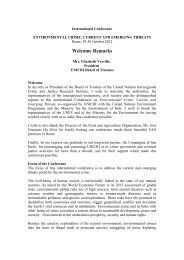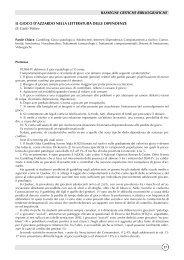Biomedical Research in Developing Countries - UNICRI
Biomedical Research in Developing Countries - UNICRI
Biomedical Research in Developing Countries - UNICRI
Create successful ePaper yourself
Turn your PDF publications into a flip-book with our unique Google optimized e-Paper software.
appropriate guidance <strong>in</strong> order to deal with critical issues and to deliver their<br />
functions appropriately 26 .<br />
CONCLUSIONS AND RECOMMENDATIONS<br />
As we have discussed throughout this book, tra<strong>in</strong><strong>in</strong>g, organizational fund<strong>in</strong>g and<br />
<strong>in</strong>dependence are the key factors for the development of RECs <strong>in</strong> Africa. However, a<br />
strong political commitment is also needed to create the necessary research<br />
governance mechanism, such as specific laws and legislation, guidel<strong>in</strong>es and<br />
common standards, as well as monitor<strong>in</strong>g mechanisms for external audit<strong>in</strong>g of<br />
RECs function<strong>in</strong>g.<br />
The current and future <strong>in</strong>crease of <strong>in</strong>ternational cl<strong>in</strong>ical trials <strong>in</strong> Africa, for diseases<br />
that rank low <strong>in</strong> its health priorities and that may take advantage of weak<br />
regulatory systems and lower costs, necessitates measures to <strong>in</strong>crease the African<br />
pool of expert bioethicists, who can develop orig<strong>in</strong>al guidel<strong>in</strong>es, to respond<br />
appropriately to the implementation of the research projects and make a real impact<br />
on the decision mak<strong>in</strong>g, that is still mostly done <strong>in</strong> the sponsor countries.<br />
The creation of a genu<strong>in</strong>e ethical work<strong>in</strong>g environment at the level of researchers<br />
and reviewers is urgent to ensure that corruption and lack of transparency and<br />
accountability towards violations are identified and <strong>in</strong>stitutionally approached.<br />
To this purpose, it would be also important to re<strong>in</strong>force the culture of ethics and<br />
legality of biomedical research with human participants among policy makers and<br />
judges, <strong>in</strong> order to strengthen the knowledge base and decision mak<strong>in</strong>g powers on<br />
these themes and to ultimately re<strong>in</strong>force the national normative capacity, the rule<br />
of law and the prevention and control of crim<strong>in</strong>al offences.<br />
The sensitization of policy makers would facilitate the <strong>in</strong>clusion of the ethical and<br />
legal issues of biomedical research with humans <strong>in</strong> a susta<strong>in</strong>able political agenda<br />
and promote the issu<strong>in</strong>g of specific legislation <strong>in</strong> this field, based on the development<br />
needs of the countries.<br />
The <strong>in</strong>crease on the awareness by judges and magistrates on the themes of ethics<br />
and legality of biomedical research with human participants would <strong>in</strong>tegrate these<br />
issues <strong>in</strong> the everyday legal and judicial practice and <strong>in</strong>crease the <strong>in</strong>stitutional<br />
capacity to respond and tackle the issues that can arise <strong>in</strong> cl<strong>in</strong>ical trials with human<br />
participants, with particular regard to vulnerable population, <strong>in</strong>clud<strong>in</strong>g women and<br />
m<strong>in</strong>ors.<br />
26 Chima, S.J., Regulation of <strong>Biomedical</strong> <strong>Research</strong> <strong>in</strong> Africa, British Medical Journal, 2006, Vol. 332, Pages 848-851<br />
147


